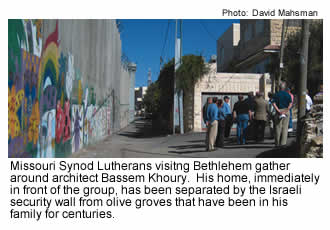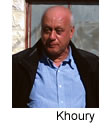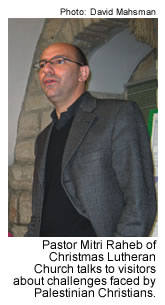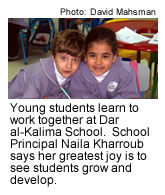by Rev. David L. Mahsman
It used to be that architect Bassem Khoury could stand on his front porch, take in the warm sunshine, and look out over the beauty of the hills and olive groves that have been in his family for centuries. No more.
 Khoury can still stand on his front porch, and the sun still shines. But all he can see now is a wall a few yards from his front door and some 25 feet high—slabs of concrete, grey but for some colorful graffiti, topped by a fence and punctuated by guard towers.
Khoury can still stand on his front porch, and the sun still shines. But all he can see now is a wall a few yards from his front door and some 25 feet high—slabs of concrete, grey but for some colorful graffiti, topped by a fence and punctuated by guard towers.
It isn’t even possible for Khoury, a balding, grey-haired man past middle age, to visit the family lands anymore. The trip of a couple hundred yards would take hours now, if he could get there at all, which he can’t. He adds that his home is worth maybe a tenth of what it was before the wall was built.

Welcome to the West Bank in the Israeli-occupied Palestinian territories. Welcome to Bethlehem, birthplace of our Lord Jesus.
Jesus is Khoury’s Lord, too. Khoury is a Palestinian Christian—a Lutheran, in fact—stuck behind a wall and fence built by the Israelis on Palestinian land, ostensibly to keep terrorists out of Israel. It may do that, but it also restricts the movement of all Palestinians, takes their land, and separates many of them from friends, relatives, and employment opportunities.
It could make a person bitter. How does Khoury deal with that?
“As Christians, we are taught to forgive,” he answered simply.
“Even as Christians, we can get very angry,” says his pastor, Rev. Mitri Raheb. “Whenever I get angry, I start a new project . . . and channel the energy into ministry.”
Bright Stars and Wheat Ridge
Raheb, pastor of Bethlehem’s Evangelical Lutheran Christmas Church, is involved in a lot of ministries. Besides the church, there is a K-12 school, a health and wellness center, a cultural and conference center, and a college. Programs include elder care, child development, young couples ministry, promotion of the arts, and “authentic” tourism.
A contingent of Missouri Synod Lutherans, including LCMS President Gerald Kieschnick (see “From the President,” page 29), was in Bethlehem in late November and early December. The group included parish nurses who would lecture at a medical symposium; others along had been invited by Bright Stars of Bethlehem, a U.S. nonprofit organization, to see firsthand what Lutherans there are doing.
Bright Stars was established by a group of Missouri Synod Lutherans to provide ongoing support for the work in Bethlehem, much of which was started with seed grants from Wheat Ridge Ministries. Wheat Ridge, an LCMS recognized service organization that focuses on health and healing, has invested more than $2.3 million in projects in Bethlehem since 2000. Bright Stars, which now provides funds for work there, is applying for recognized service organization status through the Synod’s Board for Mission Services.
“The overarching purpose of our ministry is to maintain a Christian presence in the Holy Land,” says Gregg Smith of Tampa, Fla., chairman of the Bright Stars board.
Bethlehem once was a Christian town. Some estimates say Arab Christians made up 85 percent of the population in 1948, but emigration and a lower birthrate than among Muslims have made Christians a minority today.
“We are trying to create an environment that makes it attractive for Christians to stay and flourish,” Smith told me during our visit.
 It’s not easy to live here, says Raheb. He understands why Christians leave.
It’s not easy to live here, says Raheb. He understands why Christians leave.
“I think we are heading toward an apartheid system that for two generations will make our lives miserable,” he said of the division between Palestinians and Israelis. “At the same time, I am very hopeful,” he said, and adapted a statement attributed to Martin Luther: “Even if the world is coming to an end tomorrow, plant an olive tree.”
Raheb said he believes that only Christians can bring real hope to the West Bank. They need to stay.
Health and Hope
The first Wheat Ridge grant, awarded in 2000, established the Dar al-Kalima (“House of the Word”) Health and Wellness Center, which was dedicated in 2003 to serve the entire Palestinian community. The center today has endocrinology, nutrition, audiology, and psychotherapy clinics. The wellness aspect makes use of an indoor swimming pool, a fitness room, and a gym.
Rami Khader, a Lutheran from Bethlehem who earned bachelor’s and master’s degrees at Concordia University, Chicago, Ill., is manager of the center. He said that one purpose of the wellness center is to help people relieve some of the stress caused by the circumstances under which the Palestinians live.
In 2004, Wheat Ridge engaged Dr. John Eckrich, a Lutheran physician from St. Louis, to assess medical needs in the area. As a result of previous work, he said he knew that community nursing and the concept of a parish nurse held the most promise. So, when he traveled to Bethlehem for the assessment, he took with him a team of nurses, among them Marcia Schnorr, the Synod’s national coordinator of parish nursing through its Board for Human Care Ministries.
Eckrich said one of the team’s conclusions was to focus on the metabolic syndrome, a group of diseases that includes diabetes, hypertension, elevated lipids, and obesity. Another was to work with the elderly.
Following the team’s recommendations, the health and wellness center hired one of only two endocrinologists in the West Bank, as well as a public-health nurse practitioner and the West Bank’s only nutritionist.
It was harder to find a parish nurse. The concept was unknown in the Middle East.
Raheb found a Christian nurse, Raida Mansour. For a year, she and several other nurses studied parish nursing via the Internet with materials that Schnorr adapted for the Palestinian context. Then, with funds provided by the LCMS Northern Illinois District Parish Nurse Network, Mansour traveled to the United States, where she stayed a month at Schnorr’s home in Rochelle, Ill.
In November 2007, Schnorr and a team of nurses were in Bethlehem. A pinning ceremony was held for Mansour, who then formally became the first parish nurse in the West Bank.
“It is somewhat difficult to come here and do medical care because of the economic and political situation,” Eckrich said. But for four years, he and other medical people, including Schnorr and her teams of nurses, have been making the trip and conducting symposia for Palestinian medical personnel.
“They can’t go out, so we have to go in,” Schnorr said of those who attend the symposia.
In May 2008, the nurses lived with members of the elder-care program. One woman told Schnorr, “They can build a wall around our city, but they cannot build a wall around my heart.” Schnorr added, “That reminded me of Romans [8:38–39], that nothing can separate us from God’s love, including a wall.”
Other Endeavors
 Naila Kharroub, the principal at Dar al-Kalima School, says her greatest challenge “is to educate students in a peaceful way and keep Christianity here.”
Naila Kharroub, the principal at Dar al-Kalima School, says her greatest challenge “is to educate students in a peaceful way and keep Christianity here.”
The school, a glistening white building high on a hill, adjacent to the health and wellness center, has 270 students from kindergarten through the 12th grade. They come from Bethlehem, from the nearby towns of Beit Sahour and Beit Jala, and from other villages. They are 42 percent Christian (mostly Greek Orthodox, but 6 to 7 percent Lutheran) and 58 percent Muslim.
Each day starts with morning devotions, which, of course, are Christian. The Muslim students attend, too, and their parents are aware of that. Still, the quality education that the school provides brings many applications from Muslim families, Kharroub said.
“More apply than can be accepted,” she said. “We look for a balance of Muslims and Christians, . . . between boys and girls, and academic level.”
“We are people called to proclaim the Gospel in a fresh way to our people,” Bishop Munib Younan of the Evangelical Lutheran Church in Jordan and the Holy Land (ELCJHL) told us at dinner one evening. Christmas Lutheran Church is one of six congregations in the small church body, which has 3,000 children in its schools.
Younan said education is a priority for the ELCJHL as an avenue for a “Lutheran evangelical witness.”
Raheb and his colleagues in an organization called “Diyar” (Arabic for “homes”) that operates the church’s ministries are moving beyond elementary and high school education and into higher education. Standing on the roof of the school one afternoon, we watched construction workers building two new buildings on the campus—one an extension to the health and wellness center, the other a home for the first Lutheran college in the Middle East.
While the building goes up, the Dar al-Kalima College holds classes at Christmas Lutheran Church across town. Its initial program was accredited by the Palestinian Ministry of Higher Education in 2006 to offer a two-year associate’s degree.
Dr. Nuha Khoury, the college dean, said the school started with 22 students and two programs: glass and ceramics and documentary filmmaking. It already is moving into jewelry design, music performance, and tour guiding.
Plans are in the works to seek accreditation to grant the bachelor’s degree and, eventually, for a master’s degree program “so the college can become a university.”
Khoury said current programs teach disciplines that are not already in the Palestinian system.
“We want to keep people on the land; we don’t want them to emigrate,” she said. “Thirty-eight percent of new students are unemployed. Many others leave. But if we create new disciplines that take people in for two years that have a job market, that’s what we aim for.”
She added that the college provides yet another way for Lutherans to influence young people, the future leaders of Palestine.
 There is still more that the Lutheran Diyar organization is doing in Bethlehem. Its International Center of Bethlehem, for example, has programs intended to preserve the culture of the Palestinian people. It houses a conference center, an arts and crafts center, and a gift shop as an outlet for the artistic output of its clients. A media center there produces documentaryfilms, news reports, talk shows, dramas, and Christian-music concerts for broadcast throughout the Palestinian territories and in the larger Arab world.
There is still more that the Lutheran Diyar organization is doing in Bethlehem. Its International Center of Bethlehem, for example, has programs intended to preserve the culture of the Palestinian people. It houses a conference center, an arts and crafts center, and a gift shop as an outlet for the artistic output of its clients. A media center there produces documentaryfilms, news reports, talk shows, dramas, and Christian-music concerts for broadcast throughout the Palestinian territories and in the larger Arab world.
“We try to be an incubator for leaders for Palestine,” Raheb told us. “This is a clearinghouse for leadership.”
Gregg Smith, the Bright Stars of Bethlehem chairman, figures he has been to Bethlehem more than 20 times in the last 12 years. He said that each of Diyar’s ministries “is designed to provide a range of opportunities to raise children, educate them well, maintain their health—from womb to tomb.”
He refers with a smile to “our 300-year plan,” which sees expansion throughout the West Bank. “As a Palestinian state develops, we want a Christian presence to develop with it,” he said.
‘Hope Peddlers’
Dr. Richard Bimler, the immediate past president of Wheat Ridge Ministries, said that Lutherans are offering “hope in a hopeless situation.” He called Raheb and his colleagues “hope peddlers.”
Raheb acknowledges that he is not optimistic about the future of Palestine or the prospects of peace in the Middle East, “but I am hopeful.”
“Maybe peace will never come,” Raheb said. “But I will not waste my life and time waiting for something to come . . . . Our Messiah came 2,000 years ago.” Raheb added, “He is the Prince of Peace.”
Rev. David L. Mahsman is assistant to the executive director of LCMS World Mission and former executive editor of The Lutheran Witness.
How to Help and Learn More
How can we be helpful to you?” The question came after several days in Bethlehem and seeing what Palestinian Lutherans are doing to bring some hope to their people and to maintain a Christian presence in a Muslim-dominated region.
“Often groups come here, are moved, and want to do some-thing,” answered Rev. Mitri Raheb, pastor of Christmas Lutheran Church. “I say you don’t need to do anything. Don’t feel pressured. I would like you to go away from Bethlehem energized, . . . ready to go, ready to do miracles.”
Having said that, though, he offered three suggestions:
- Pray for the people and the ministry in Bethlehem.
- Visit Bethlehem. “Your visits mean more than you can imagine,” Raheb said. He said 200,000 Lutherans visit the Holy Land every year “but [they] miss what you witnessed. What a waste. Can’t you encourage them to come here and get a small piece of hope before they leave?”
- Support a project. “It could be planting a tree, helping with a scholarship, helping to build a classroom. That makes your passion incarnate.
Information about tours and donating is available at the Web site of Bright Stars of Bethlehem (http://www.brightstarsbethlehem.org/). Also, take a look at the video “It’s PalesTIME” (there’s a link on the Bright Stars home page) to get a better idea about “authentic tourism.” Bright Stars board chairman Gregg Smith, a frequent visitor to Bethlehem, says that the recent conflict in the Gaza Strip should not discourage visits to Bethlehem and the West Bank, which are geographically separate from Gaza.
Wheat Ridge Ministries has a “Hearts for Jesus” project called “Bethlehem, We Care!” It supports the Dar al-Kalima School and the adjacent health and wellness center. For information, go to www.wheatridge.org/Bethlehem.
You also can go directly to Web sites operated by the Lutherans in Bethlehem:
- For Diyar, the umbrella organization for the various ministries, go to http://www.diyar-consortium.org/.
- Dar al-Kalima School: www.annadwa.org/school/daralkalima.htm.
- Dar al-Kalima College: http://www.daralkalima.edu.ps/.
- Dar al-Kalima Health and Wellness Center: http://www.daralkalima.org/.
- International Center of Bethlehem: http://www.annadwa.org/.





